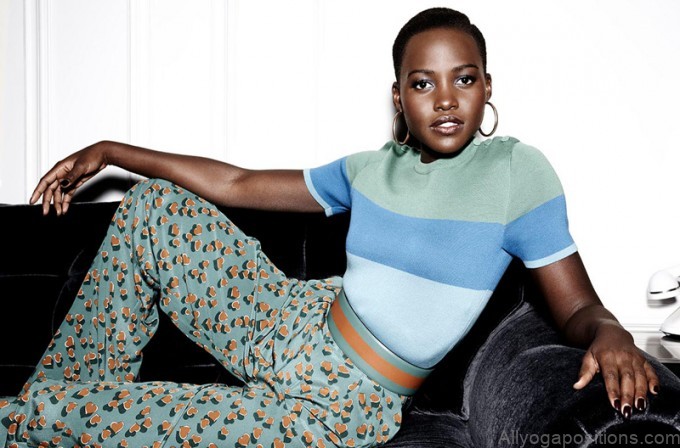To get ready for her role as Black Panther’s Nakia – a street-fighting, Wakandan expert in espionage – Lupita Nyong’o endured an intense six-week boot camp with her co-stars before filming to prepare her for the various physical challenges and stunts in the film. Strength, stamina and flexibility training lasted for four hours a day, in addition to extra time spent to hone her character’s individual skills of jujitsu, capoeira, and using ring blades.
Lupita Nyong’o Workouts Routine For Black Panther Photo Gallery
When actress Danai Gurira, who plays the leader of the all-female Dora Milaje army in Black Panther, was asked in a panel interview to explain the recent demand from audiences ‘for more, and different, kinds of female heroes’, she answered that until Wonder Woman, audiences never had the chance to sate their thirst for female-driven action films, because the ‘gatekeepers’ of the film industry weren’t even making the films in order to give audiences a choice. ‘I’m always wondering, what is this representation where women always need to be saved by men? That’s gatekeepers deciding that is what we need to see. And it’s time to change that. Please,’ she said. Someone who very much agrees with Gurira is the critic, journalist, film director and fitness fanatic Bidisha SK Mamata, who, having completed five marathons and 10 half-marathons, has often asked: ‘where are representations of modern, motivated women like us on screen? Nowhere’.
So does Mamata think the Me Too movement has had an impact on the increase of female action stars and movies, or was change was already afoot? ‘Me Too started in Hollywood, and what we now know about the way Hollywood operates explains why its treatment of women actors, directors, characters, stories and representation is so insulting and so atrocious,’ she says. ‘Audiences have long wanted to see dimensional, strong, vivid, active women characters up on screen, who enjoy the same adventures, rights of passage, athletic feats and action narratives that men do. We are finally seeing women characters who are powerful, who occupy space without apology, who drive their own narratives, who are tough and emotionally independent. I only hope that the capable, clever, strong women we are seeing represented on screen are matched by equal numbers of women directors and writers behind the camera, so we can win our fight to be everything we want to be.’
The positive impact powerful and independent female movie characters have on women cannot be overstated, which is why actress Zoe Saldana, who has played Gamora in various Marvel films, plus Neytiri in Avatar and Uhura in the Star Trek franchise, loves working within the sci-fi genre: ‘I love the fact that in science-fiction movies the women get to be much stronger and tougher, instead of being dependent on men. As a woman, I feel it is important to play active and involved women.
These kinds of characters help educate younger generations of women to be leaders and aspire to great things. I wasn’t interested in playing submissive women. I wanted to play characters that not only I could be proud of, but which would offer good role models for young women. If we only play female characters whose point in the story is just to fall in love with a man, that’s very limiting to women. We need to provide better images and better stories.’


